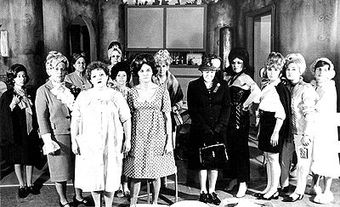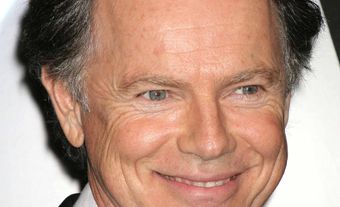Donald McNichol Sutherland, CC, actor (born 17 July 1935 in Saint John, NB; died 20 June 2024 in Miami, Florida). Donald Sutherland was one of Canada's best-known and most accomplished actors. A prolific performer of considerable, chameleon-like range, he was both a leading man and a supporting player in comedies, dramas, horror and science fiction, amassing nearly 200 credits across six decades. His roles in The Dirty Dozen (1967), M*A*S*H (1970), Kelly’s Heroes (1970) and Klute (1971) made him a star. He won a Genie Award, an Emmy Award and a Golden Globe and was made a Commander of the Ordre des Arts et des Lettres of France and a Companion of the Order of Canada. He was honoured with a star on Canada's Walk of Fame and Hollywood's Walk of Fame. He received an Honorary Academy Award in 2017.

Education and Early Career
Donald Sutherland received a Bachelor of Arts with a major in English from the University of Toronto in 1958. He then worked at the Perth Repertory Theatre in Scotland and appeared on the London stage for three more years before beginning his prolific movie career.
Career Highlights
Although much of his work was filmed internationally, Donald Sutherland was seen in many Canadian movies. Early in his career he made notable appearances in Act of the Heart, which was filmed in 1968 but not released until 1970 after Sutherland's success in M*A*S*H (1970), as well as Alien Thunder (1972), in which he appeared with his third wife, Canadian stage actress Francine Racette. Murder by Decree (1978) and Threshold (1981) followed. In this Canadian environment, his high visibility and his gifts as an actor attracted much-needed investment dollars.
For Hollywood, Sutherland made starring appearances in The Dirty Dozen (1967), M*A*S*H (1970), Kelly’s Heroes (1970), Klute (1971), Don't Look Now (1973), The Day of the Locust (1975), The Eagle Has Landed (1976), Invasion of the Body Snatchers (1978), Ordinary People (1980) and Eye of the Needle (1981). His tall, earnest and diffident image became a familiar one throughout the world.
In Canada, his strong personal identification with the famous doctor and socialist Dr. Norman Bethune began with his appearance in the CBC television drama Bethune (1977) and culminated a decade later when he spent months on location in China for the troubled production of Phillip Borsos’s Bethune: The Making of a Hero (1990).
In the European auteur film community, Sutherland worked with Nicolas Roeg, John Schlesinger, Claude Chabrol and Louis Malle. He played Gauguin for Henning Carlson and Bernardo Bertolucci cast him as the archetypical fascist, Attila, in 1900 (1976). Federico Fellini persuaded him to play the title role in Casanova (1976), telling Sutherland his unique physical appearance was perfect for the role.
Sutherland continued to be prolific in commercial cinema, with dozens of movie appearances in starring or supporting roles after 1990, including Backdraft (1991), JFK (1991), Six Degrees of Separation (1993), Outbreak (1995), A Time to Kill (1996), Without Limits (1998), Space Cowboys (2000), The Art of War (2000), The Italian Job (2003) and Pride & Prejudice (2005).
In 2008, he appeared as wealthy businessman and family patriarch Tripp Darling in the television series Dirty Sexy Money, and he had a recurring role in the miniseries The Pillars of the Earth in 2010. In 2011, he was seen in feature films The Mechanic, The Eagle, Man on the Train and Horrible Bosses, and on television in a recurring role as Father Mapple in Moby Dick.
Sutherland was exposed to a new generation of film fans when he portrayed the malevolent President Snow in the global hit The Hunger Games (2012), as well as the sequels The Hunger Games: Catching Fire (2013), The Hunger Games: Mockingjay – Part 1 (2014) and The Hunger Games: Mockingjay – Part 2 (2015).
Family Connections
Donald Sutherland was married three times. First, to actor Lois Hardwick from 1959 to 1966. Later in 1966, he married actor Shirley Douglas, the daughter of famed Canadian politician Tommy Douglas. They had two children together — actor Kiefer Sutherland and production manage Rachel Sutherland — and divorced in 1971. Sutherland was then married to actor Francine Racette from 1972 until his death from a lengthy illness in 2024. They had three children together: talent agent Roeg Sutherland (named after Don’t Look Now director Nicolas Roeg), actor and producer Angus Sutherland, and actor Rossif Sutherland.
Sutherland was also the half-brother of poet John Sutherland and painter Betty Sutherland, whose works are in the collection of the National Gallery of Canada.
Honours and Awards
In 1983, Donald Sutherland won a best actor Genie Award for Threshold, in which he starred as a cardiovascular surgeon who performs the world's first human heart implant. In 1995, he received an Emmy Award for best supporting actor in the television movie Citizen X, about the hunt for a Russian serial killer. He received a Golden Globe for that performance and another for his portrayal of Clark Gifford in John Frankenheimer's Path to War (2002).
Donald Sutherland was made an Officer of the Order of Canada in 1978 and was promoted to Companion in 2019. He was made an Officer of the Ordre des Arts et des Lettres of France in 1983 and was promoted to Commander in 2012. He is the subject of a National Film Board documentary called Give Me Your Answer True (1987). He was honoured with a star on Canada's Walk of Fame in 2000, followed by a star on Hollywood's Walk of Fame in 2011. He received an Honorary Academy Award in 2017 and a Lifetime Achievement Award from the San Sebastián International Film Festival in 2019. In 2023, Canada Post issued a commemorative stamp in his honour.
See also Donald Sutherland (Profile); Sutherland and Douglas Share the Stage.

 Share on Facebook
Share on Facebook Share on X
Share on X Share by Email
Share by Email Share on Google Classroom
Share on Google Classroom


